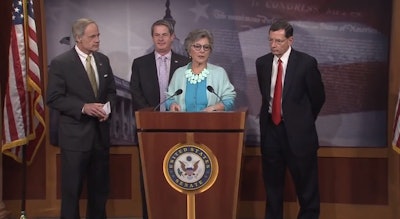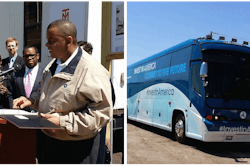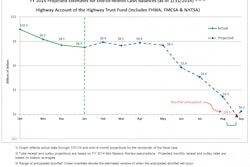 From left to right: Sen. Tom Carper, Sen. David Vitter, Sen. Barbara Boxer, Sen. John Barraso
From left to right: Sen. Tom Carper, Sen. David Vitter, Sen. Barbara Boxer, Sen. John BarrasoKey transportation leaders in the U.S. Senate have agreed to several priorities for the next highway bill, with the two key elements being passing a longer-term bill and maintaining current highway spending levels.
Sen. Barbara Boxer (D-Calif.), chairman of the Environment and Public Works Committee, along with committee ranking members Sen. David Vitter (R-La.) and Sen. John Barrasso (R-Wy.) and Transportation and Infrastructure subcommittee chair Sen. Tom Carper (D-Del.), held a press conference April 10 to say they had reached an agreement “in principle” on the next highway reauthorization bill.
The conundrum of how to pay for it, though, will be left to others. That matter, however, is pressing, as the Highway Trust Fund is expected to run dry this summer, as early as July. The current MAP-21 highway funding act expires Sept. 30.
Boxer et al. said their priorities with the bill are:
- Passing a long-term bill, as opposed to “a short-term patch;”
- Maintaining the formulas for existing core programs;
- Promoting fiscal responsibility by keeping current levels of funding, plus inflation;
- Focusing on policies that expand opportunities for rural areas;
- Continuing our efforts to leverage local resources to accelerate the construction of transportation projects, create jobs, and spur economic growth; and
- Requiring better information sharing regarding federal grants
“The reason the four of us are standing here is to send a strong signal to this country that we, as leaders of this committee, have worked across party lines to act before the Highway Trust Fund cannot pay its bills,” Boxer said. “For those of you who follow this issue, you know that the Highway Trust Fund is expected to run out of money later this summer, which would be devastating to thousands of businesses and millions of workers across the country.”

Vitter said the legislation is nonpartisan and pushed for the Senate Commerce and Banking committees to develop a long-term highway funding plan quickly.
“Having a good robust highway infrastructure is a key part of the backbone of the economy, and we all support doing that in a responsible, open and transparent way,” he said. “And the detailed outline of transportation policy that we have developed that’s being turned into legislative language now does just that.”
Click here to read prior OD coverage about the proposals so far for how to fund the highway bill, which include fuel tax increases, corporate tax reform, vehicle mileage tax and more.









